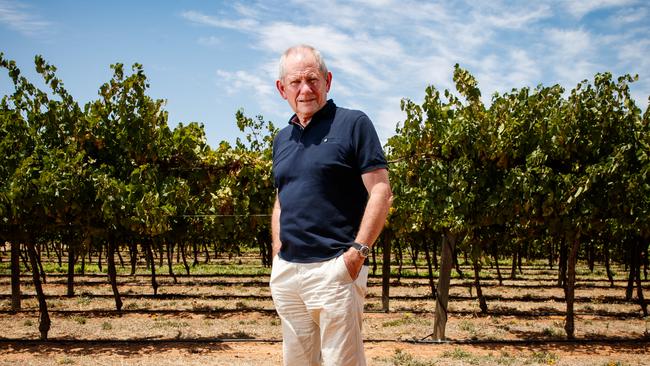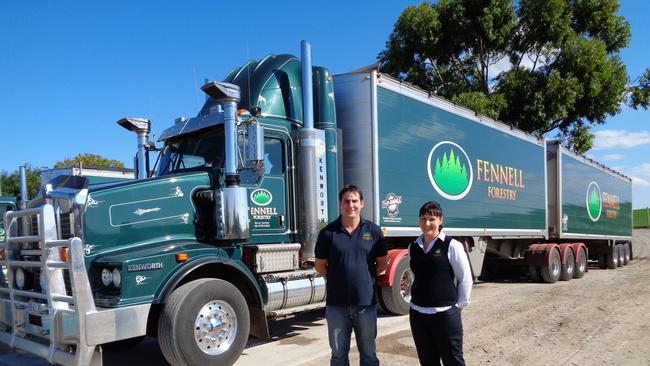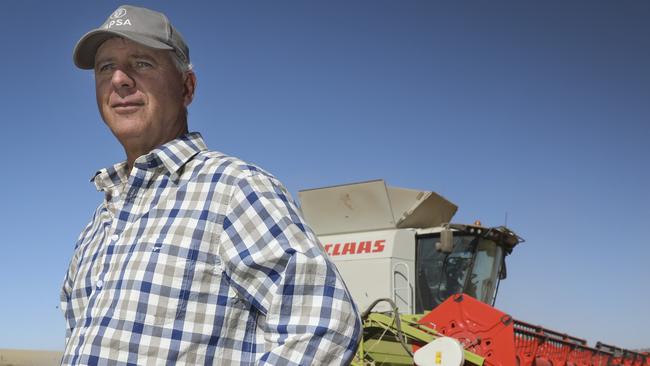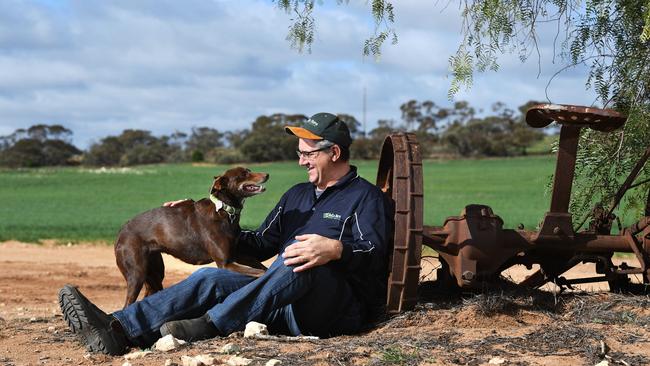SA regions count the cost of China trade war on wine, forestry, barley, rock lobster trade blocks
China’s trade blocks are being felt far and wide and those hardest hit are struggling to deal with the gaping hole left by the lost exports.

SA Business
Don't miss out on the headlines from SA Business. Followed categories will be added to My News.
The wine shipments have ground to a halt, the lobster pots pulled out of the water and forestry workers stood down from their posts.
South Australia's regions have felt the impacts of China’s trade blocks far and wide, with industries now facing the mammoth task of sourcing new markets to fill the gaping hole the country has left in our exports.
The South-East is likely to be among regions hardest hit, as forestry, lobster fishing and wine are key pillars in the local economy.
The Green Triangle forestry sector, which covers southeastern SA and southwestern Victoria, estimates that more than 150 people – mostly in harvest and haulage work – have either been stood down or let go in response to a ban on logs shipped from Portland.
The Chinese this month issued the ban citing detection of live bark beetle in consignments from Victoria, sending shockwaves through the industry based around Mount Gambier.
Fennell Forestry owner Wendy Fennell said those employed in the transport side of her business were down to four days’ work a week.
“Everyone is trying to keep everyone busy but on reduced hours to see what solutions come about,” she said.
“Forest owners are looking to try other markets and send wood in different directions.”
Ms Fennell said the China trade blocks would have a “huge impact” on businesses and service providers in the South-East, because the area also relied heavily on fisheries and the Coonawarra wine industry for employment.
The rock lobster fishery experienced a horror start to the year when COVID-19 cancelled Lunar New Year celebrations, axing shipments to China – which accounts for about 95 per cent of the export market.
It began to recover this year until lobster started facing customs clearance delays, causing mass export cancellations.
Now, exports from SA are “completely shut”, says Kyri Toumazos, of the SA Northern Rock Lobster Zone Fishermen’s Association, apart from “extremely small quantities” heading to other countries.
“The (Chinese) market took 30 years to build – we went through a hard journey to build that market,” said Mr Toumazos, who represents fishers between the state’s western border and the Murray Mouth.

“If people think we can establish a new market in three months, six months, or a year, they just don’t understand.”
Many people have stopped fishing, and he hopes the State Government will consider providing licence fee relief to help keep fishers afloat.
The sector employs about 700-800 people in SA, but Mr Toumazos says the flow on effects of fishers’ work drying up will be “enormous”, extending to supporting sectors such as finance, transport and refrigeration – not to mention the impact on spending in the regions.
“A lot of the towns are relatively concerned because we’re one of those fundamental industries that are helping regions survive,” he said.
Among those hit was Kangaroo Island, which after bushfires and COVID-19 travel shutdowns, “hasn’t had a good news story for a long time”.
“My fundamental concern is the mental health state of my members – having 12 months of hardship and no light at the end of the tunnel is making the situation very volatile,” Mr Toumazos said.

Scott Walden, based just out of Kingscote, said he was averaging about $35/kg for his rock lobster, compared with up to $90/kg this time last year.
“I’m not making any money out of it – I’m just trying to keep my deckhand employed,” he said.
“I know several boats are being told to come back in because of the fact that the volume can’t be sustained in the market we’ve got in Australia.”
Meantime, grain growers across the state – and in particular on the Yorke Peninsula, Northern Eyre Peninsula and Mallee – are feeling the impacts of China’s 80 per cent tariffs on Australian barley.
Grain Producers SA chair Adrian McCabe said premium malt barley was now being sold at feed grain prices because there were few other markets for the country’s produce (see separate report).
“In a year when we’re having a really big harvest, that’s hurting barley growers,” he said.
And after they’ve dealt with bushfires, smoke taint and lockdowns, wine producers are suffering again.
South Australia usually exports about $800m worth of wine to China each year, with the country accounting for about 60 per cent of the value of what’s sent overseas.
But with tariffs of up to 212 per cent imposed on Australian wine as part of an anti-dumping inquiry, the industry fears thousands of jobs will be lost across the country.
“In most cases, if not all cases, it means that the (Chinese) market has closed off to SA producers,” SA Wine Industry Association chief executive Brian Smedley said.
“They might be looking at other markets to place the product that would have gone to China somewhere else, or it may mean that they don’t produce that wine,” he said.
“That will have implications right through the supply chain. They may decide not to take the grapes for that wine, crush them, bottle it, buy the labels for it or transport it for the market.”
Mr Smedley said producers would be looking to set up new export deals with other countries, but it would be a tough battle to plug the gap in export value left by China.
He said all wine-producing regions would be impacted by the tariffs, and also suffer from the loss of international tourism associated with wine drinkers keen to experience their favourite drops locally.
Riverland Wine’s Chris Byrne said China’s tariffs could create an oversupply of wine in Australia, and a “push-down” effect on prices.
However, he said the Riverland was less exposed than other wine regions as it had already diversified to other markets such as the UK.

“Much now depends on the skill-set of our diplomats and our politicians in working effectively to … restore more balance to our trading because it’s critical that we work with China and the other Asian countries,” he said.
A range of issues are believed to have led to Australia’s trade relationship woes with China.
In April, Prime Minister Scott Morrison called for an independent inquiry into the pandemic’s origins, and China reacted by warning of a boycott on Australian goods. Early reports indicated the coronavirus may have originated from a wet market in Wuhan.
FARMERS LOOK FOR MORE BASKETS FOR THEIR EGGS
John Gladigau estimates that the disappearance of South Australia’s malt barley market will shave about $80,000 off his farm’s bottom line this year.
Chinese buyers account for most of the state’s malt barley exports, using the grain to make beer.
Growers have been forced to sell this year’s malt-quality barley at feed prices, after China in May imposed an 80 per cent tariff on barley from Australia.
“We’ve just come out of three devastating years of drought and we’ve suddenly got a fantastic year and about 90 per cent of our barley is going malt, which is just ridiculous, and yet the malt premium is basically zero,” said the Bulla Burra Farm co-owner, based near Loxton.
“It could have added a significant amount to our business.”
Mr Gladigau said the blow would be softened by the fact that it was a high production year and feed barley prices, $5-$60 lower than malt barley prices – had held up well amid high demand.
“The reality is that one good year doesn’t make up for three devastating years of drought, so we’re trying to make every post a winner,” he said.
The industry now needs to reassess other potential markets, he said, to reduce its reliance on China.
“There are other countries like India for example that’s a huge nation that drinks a lot of beer that we probably haven’t focused on in the past because we’re so reliant on China paying a much higher premium. We need to be not putting all of our eggs in one basket.”
And it’s unlikely Australia’s craft beer obsession will make much of a dent in our barley supplies.
“I think if we drank enough beer here to use all of our malt barley we’d have much bigger problems as a society,” Mr Gladigau said.


